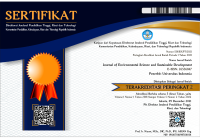Abstract
Solid wastes at PT Pertamina in Jakarta were dominated by the corrugated box, so this research aims to utilize PT Pertamina’s corrugated box waste into furniture using Design for Environment (DfE) guidelines. Stages in this research use the design and development product theory of Ulrich & Eppinger, consisting of Phase 0 of Product Planning along with step 1 of the DfE guidelines. Phase 1 Concept Development is concurrent with stage 2 DfE guideline Identification of Potential Environmental Impacts and Selection of DfE guidelines. Phase 2 System-Level Design works in conjunction with the 3rd stage of the DfE Guide to Initial Design Guidelines. The selected design is modular with a sectionalmodular architecture type that can be arranged into three functions—table, shelf, and chair—so the product was named Mersi, which in the Indonesian language is an abbreviation of table, chair, and shelf (meja, kursi, lemari). The Phase 3 Detail Design added ergonomic aspects into the product design. In this phase, an alpha prototype is created, and the impacts on the environment are measured by the DfE phase 4 guideline, and the four factors measured show that the value of the DfE fraction is close to 1, meaning the prototype is environmentally friendly. Phase 4 Testing and Evaluation of Alpha Prototype with high-performance rating results for four dimensions were measured. The final product’s DfE fraction value is close to 1, meaning that the product is environmentally friendly even if there is a component of the product that is not environmentally friendly. This product was registered to have Industrial Design, Intellectual Property Rights on March 2, 2018.
Recommended Citation
Hartono, Natalia; Christiani, Agustina; and Larasati, Candida Keshia
(2019).
MODULAR FURNITURE MADE FROM CORRUGATED BOX WASTE USING DESIGN FOR ENVIRONMENT GUIDELINES.
Journal of Environmental Science and Sustainable Development, 2(1), 48-60.
Available at: https://doi.org/10.7454/jessd.v2i1.26






